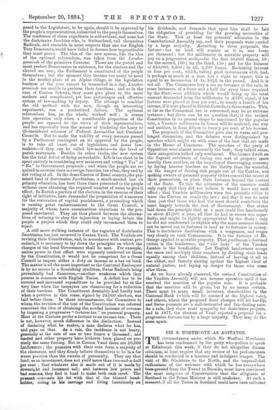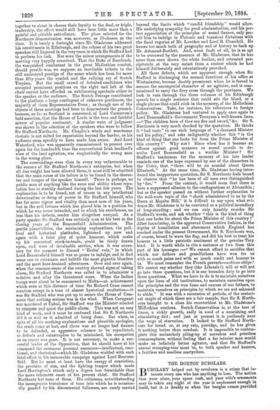SIR S. NORTHCOTE AS AGITATOR.
THE circumstances under which Sir Stafford Northcote has been condemned by the party wire-pullers to speak at Edinburgh this week, if they do not altogether disarm criticism, at least require that any review of his performances should be conducted in a humane and indulgent temper. The visit of Mr. Gladstone to the North, and the unparalleled enthusiasm of the welcome with which he has everywhere been greeted from the Tweed to Deeside, must have convinced the most sanguine of Conservatives that the allegiance of Scotland to the Prime Minister is still unshaken. At such a moment, if all the Tories in Scotland could have been collected together to shout in chorus their loyalty to the dual, or triple, leadership, the effect would still have been little more than a painful and pitiable anti-climax. The place selected for the Northcote demonstration was, moreover, as ill-chosen as the time. It is barely a fortnight since Mr. Gladstone addressed his constituents in Edinburgh, and the echoes of his two great speeches still lingered in the very room in which Sir Stafford had to perform his task. Nor were the minor arrangements of the meeting very happily conceived. That the Duke of Buccleuch, the vanquished combatant in the great Midlothian combat, should preside was, we suppose, an inevitable tribute to the still undecayed prestige of the name which has been for more than fifty years the symbol and the rallying cry of Scotch Toryism. But the small crowd of defeated candidates who occupied prominent positions on the right and left of the chair cannot have afforded an exhilarating spectacle either to the speaker or the audience. The Scotch Peerage contributed to the platform a large contingent of unknown gentlemen, the majority of them Representative Peers ; as though one of the objects of these meetings had been to demonstrate the ground- lessness, so far as Scotland is concerned, of Lord Carnarvon's bold assertion, that the House of Lords is the true and faithful mirror of popular sentiment. A similar want of judgment was shown in the selection of the speakers who were to follow Sir Stafford Northcote. Mr. Chaplin's windy and wearisome rhetoric is not suited for exportation beyond the border, as his audience seem speedily to have made him aware. And Lord Waterford, who was apparently commissioned to present over again for the hundredth time the conventional Irish landlord's view of the land agitation, was emphatically the wrong man in the wrong place.
The surroundings were thus in every way unfavourable to the mem of Sir Stafford Northcote's enterprise, but when all due weight has been allowed them, it must still be admitted that the main cause of his failure is to be found in the charac- ter and temper of the speaker himself. There is, perhaps, no public man of anything like the same real ability whose repu- tation has so steadily declined during the last few years. The explanation is to be found, not of course in any intellectual deterioration or decay of power in Sir Stafford himself, who has far more vigour and vitality than most men of his years, but in the evil fortune which has placed him in a position for which he was never intended, and to which his excellences, no less than his defects, render him altogether unequal. As a party speaker Sir Stafford was certainly seen at his best in the closing years of the Beaconsfield Administration. The gentle plausibilities, the minimising explanations, the poli- tical and historical platitudes, lightened up now and again with a faint play of quiet humour, which make up his oratorical stock-in-trade, could be freely drawn upon, and were of invaluable service, when it was neces- sary for the moment to discard " 'Ercles' vein," in which Lord Beaconsfield himself was so prone to indulge, and to find some one to extenuate and belittle the most gigantic blunders and the most hare-brained adventures. Over and over again, when the common-sense of the country showed signs of taking alarm, Sir Stafford Northcote was called in to administer a sedative and allay the threatened scare. When the Indian troops were about to be summoned to Malta—an achievement which even at this distance of time Sir Richard Cross cannot mention except in a tone of almost hysterical exultation—it was Sir Stafford who was put up to assure the House of Com- mons that nothing serious was in the wind. When Cavagnari was murdered at Cabul, Sir Stafford was the Minister selected to compose and quiet the public alarm. This was not an easy kind of work, and it must be confessed that Sir S. Northcote did it as well as it admitted of being done. But when, in spite of all his soothing explanations and plausible apologies, the crash came at last, and there was no longer bad finance to be defended, or aggressive schemes to be repudiated, or defeats and catastrophes to be minimised, his occupation as an orator was gone. It is not necessary, to make a suc- cessful leader of the Opposition, that he should have at his command the enormous personal resources—intellectual, emo- tional, and rhetorical—which Mr. Gladstone wielded with such fatal effect in his memorable campaign against Lord Beacons- field. But he must at least have the energy of conviction, the precision of aim, and the fighting temper which made Lord Hartington's attack only a degree less formidable than the more vehement onset of his present chief. Sir Stafford Northcote has none of these. His criticisms, notwithstanding the incongruous truculence of tone into which he is occasion- ally goaded by his discontented followers, are rarely carried beyond the limits which "candid friendship" would allow. His underlying sympathy for good administration, and his per- fect appreciation of the principles of sound finance, only per- mit him to indulge in Platonic and transient flirtations with the fiscal vagaries of Mr. Lowther and Lord R. Churchill. He knows too much both of geography and of history to back up Mr. Ashmead-Bartlett. And, worst fault of all, he is so apt to be overawed by the presence of Mr. Gladstone, that he has more than once shown the white feather, and retreated pre- cipitately at the very outset from a contest which he had himself deliberately and ostentatiously provoked. All these defects, which are apparent enough when Sir Stafford is discharging the normal functions of his office at Westminster, become doubly prominent when he is forced to assume the uncongenial character of an agitator, and is com- missioned to carry the fiery cross through the provinces. We look in vain through the three columns of his Edinburgh speech for a single sentence that could stir the blooa, or a single phrase that could stick in the memory, of the Midlothian Conservatives. Take, for instance, his references to foreign policy. Mr. Gladstone had ventured to apply once again to Lord Beaconsfield's Government Tennyson's well-known lines, —" The children born of thee are fire and sword," &c. Sir S. Northcote is very much shocked by the quotation. He thinks it "bad taste" to use such language of "a deceased Minister and his policy," and asks indignantly whether this "is the kind of thing that one looks for from the Prime Minister of this country ?" Why not ? Since when has it become an offence against good manners or sound morals to de- scribe Lord Beaconsfield as a warlike Minister ? Sir Stafford's tenderness for the memory of his late leader reminds one of the hope expressed by one of the characters in the Critic, that "there will be no scandal about Queen Elizabeth." At the same time, Mr. Gladstone having intro- duced the inopportune quotation, Sir S. Northcote feels bound to observe that "he has been of all men ever distinguished by ' fire.' " From the context, it would seem that there is here a suppressed allusion to the conflagrations at Alexandria ; but as the speaker passed on without further explanation to the well-worn topic of the "check administered to us by the Boers at Majuba Hill," it is difficult to say upon what evi- dence Mr. Gladstone is to be convicted as a political incendiary of long-standing ; and we can only humbly re-echo Sir Stafford's words, and ask whether "this is the kind of thing that one looks for about the Prime Minister of this country ?" After luxuriating, in the approved Conservative fashion, in the depths of humiliation and abasement which England has reached under the present Government, Sir S. Northcote was, of course, bound to wave the flag, and did his best to treat his hearers to a little patriotic sentiment of the genuine Tory kind. It is worth while to cite a sentence or two from this part of his harangue :—" We cannot afford to sacrifice that which our fathers and grandfathers have won for us with so much pains and with so much credit and honour to us. We must remember the French proverb—noblesse oblige! We cannot say whether they (the Liberals ?) will or will not go into these questions, but it is our bounden duty to go into these questions. What we have to do is to maintain ourselves upon the lines of old institutions, to maintain ourselves upon the principles and the won fame and success of our fathers, to maintain ourselves on principles by which we are not ashamed to abide." It was with a succession of periods, of the oratori- cal staple of which these are a fair sample, that Sir S. North- cote brought to a close his counterblast to Mr. Gladstone's Midlothian orations. Scotch Conservatism is, at the best of times, a sickly growth, sadly in need of a nourishing and stimulating diet ; and just at present it is perilously near the verge of starvation. It looked to Sir Stafford North- cote for bread, or, at any rate, porridge, and he has given it nothing better than sawdust. It is impossible to contem- plate this melancholy piling-up of nerveless and pointless commonplaces without feeling that a far inferior man would make an infinitely better agitator' and that Sir Stafford's annual stumping-tour must be, to both speaker and hearers, a fruitless and needless martyrdom.



































 Previous page
Previous page